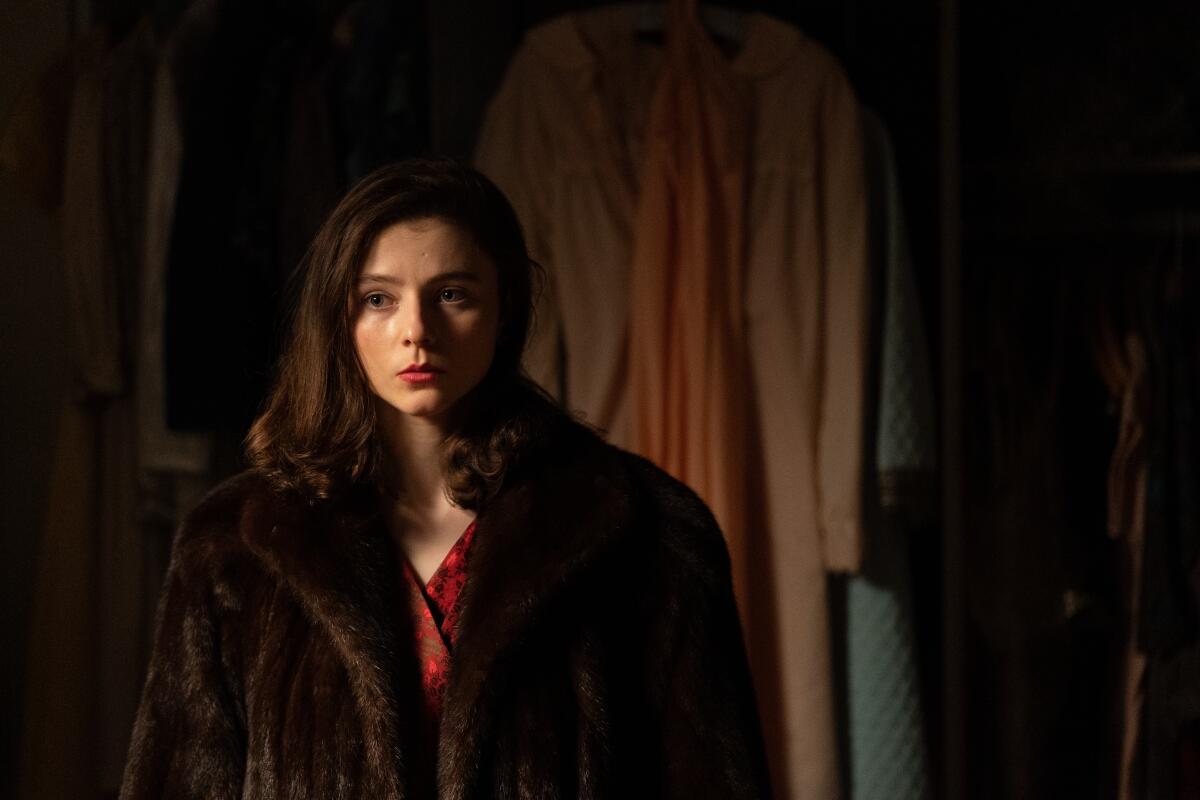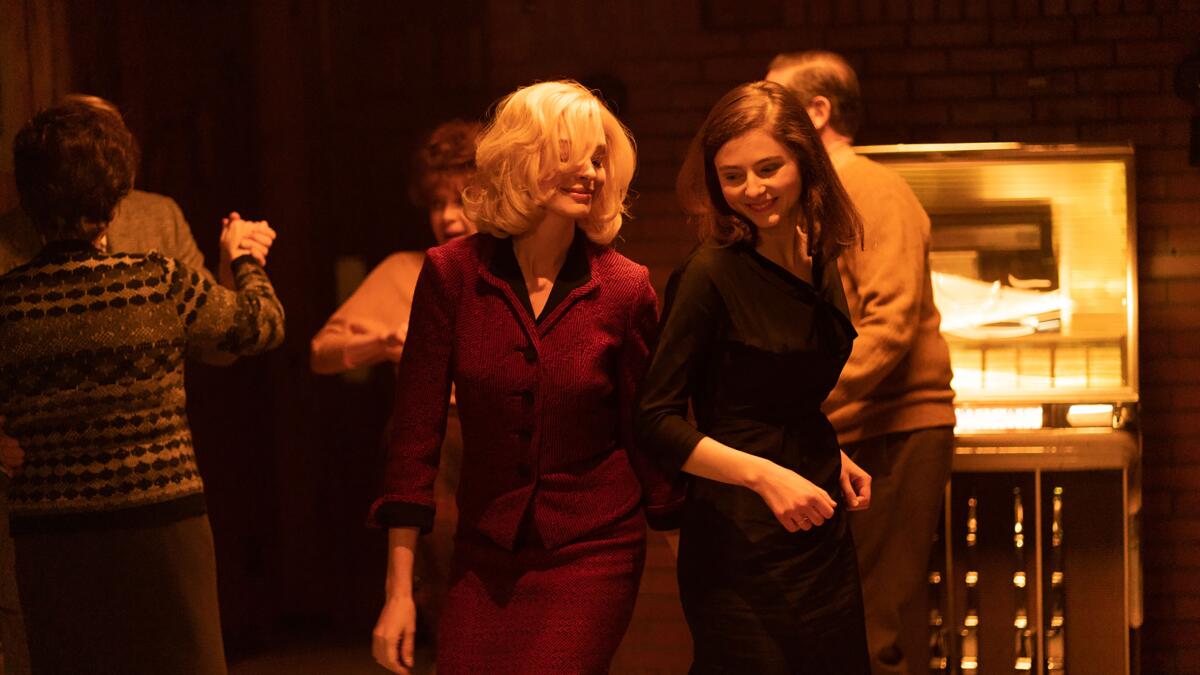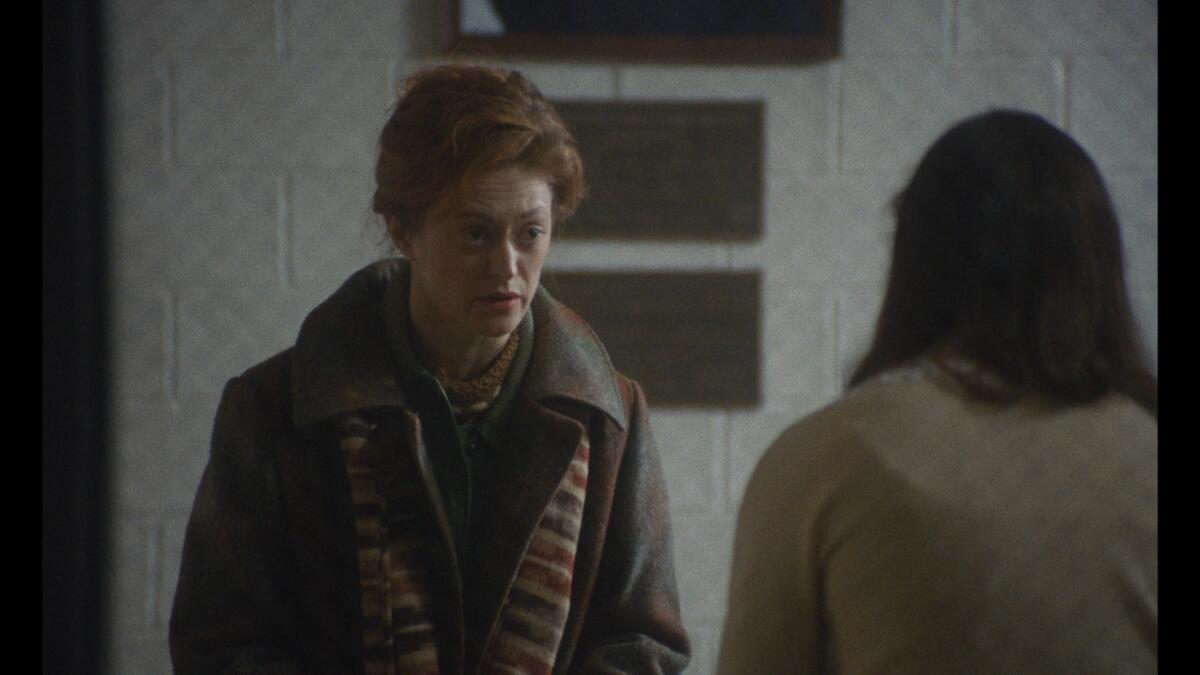Review: ‘Eileen’ has a great Anne Hathaway turn — and one of the year’s most shocking reveals

- Share via
Who is Eileen? To ask the various cranks, lechers, layabouts and scoundrels in her small Massachusetts hometown, she’s barely interesting enough to warrant the question. A soft-spoken 20-something played by a wistful, watchful, Boston-accented Thomasin McKenzie, Eileen has no boyfriend, no husband and no apparent prospects, romantic or otherwise. She works as a secretary at a juvenile detention facility, where her drab sweaters and long wool skirts render her all but invisible to the older, mostly male staff.
Those who do take notice regard her with undisguised contempt, whether it’s a snide fellow clerk (Siobhan Fallon Hogan) or Eileen’s own verbally abusive lout of a father, Jim (Shea Whigham), an embittered ex-cop who hasn’t been sober in years since his wife died: “Get a life, Eileen, get a clue,” he says, taking another swig of the beer she buys him week in and week out. Sometime later, Jim will describe his daughter’s problem in greater detail, but with scarcely more kindness. “Some people, they’re the real people, like in a movie. They’re the ones you watch, they’re the ones making the moves,” he says. “And other people, they’re just there, filling the space. That’s you, Eileen. You’re one of them.”
One of the pleasures of “Eileen,” a sleek and unnerving adaptation of Ottessa Moshfegh’s 2015 novel, is how singlehandedly it demolishes Jim’s assumption. It’s true that a film made during the 1960s, when this story is set, might not have found Eileen a compelling choice of protagonist. But the English director William Oldroyd, working from Moshfegh and Luke Goebel’s incisive script, happily discovers otherwise. Not unlike Oldroyd’s sharp debut feature, “Lady Macbeth,” “Eileen” casts a seemingly diffident young woman as the antihero of an unusually cruel liberation story. This one, however, arrives cloaked not in the silky trappings of Victorian costume drama, but the dark shadows of midcentury American noir.

Apart from the shades of red that occasionally slip into the frame — a slash of lipstick, a spurt of blood, a shiny Thunderbird convertible — Ari Wegner’s muted images mostly run the visual gamut from industrial grays to nicotine browns. Craig Lathrop, the production designer behind the vivid, hallucinatory landscapes of Robert Eggers’ “The Northman” and “The Lighthouse,” here embeds us in a dimmer but no less enveloping world of dilapidated homes and joyless offices. It’s almost Christmas, but the chill in the air has less to do with the season than with a free-floating vibe of bitterness and disappointment — signaled by the delicious notes of unease in Richard Reed Perry’s smoky-jazzy score.
Eileen periodically retreats from her small-town malaise into the pleasures and perils of a remarkably vivid fantasy life. The movie can’t convey her interiority or her eccentricity to the degree that the novel’s first-person chronicle did; here, the recurring significance of a falling icicle, while suggestive, never entirely registers. Still, Oldroyd and McKenzie keep us adroitly off-balance, whether Eileen is furtively masturbating in the presence of a handsome young prison guard or envisioning her own violent death (or better still, her father’s). But reality becomes even more intoxicating than fantasy once the detention center hires Dr. Rebecca St. John, a prison psychologist who, as played by a mesmerizing Anne Hathaway, blows into the picture like an immaculately coiffed whirlwind of worldly glamour.
Disarming her colleagues with her New York sophistication and Harvard credentials, Rebecca handles her troubled young charges with masterly ease. Few of them are more troubled than a teenage boy, Lee Polk (Sam Nivola), who stands accused of brutally murdering his father. (Marin Ireland gives a brief, wrenching performance as Lee’s mother, Rita, illuminating just how little we know of what goes on behind closed doors.) Most surprising, however, is the way Rebecca immediately attaches herself to Eileen, pulling her in for some conspiratorial office talk and later taking her out for a night of drinking and dancing. With breezy elegance and a seductiveness that Eileen can’t help but respond to, she flatters someone who’s never before drawn anyone’s attention, let alone affection.

Rebecca, of course, is one of those “real people, like in a movie” that Jim mentioned, and the fact that she’s played here by an actual movie star does little to challenge his assessment. And Hathaway, whose best performances often embrace stylized extremes, brilliantly emphasizes the mannerisms that conceal Rebecca’s deeper manipulations: the flirty way she cocks her head at Eileen or exhales a whorl of cigarette smoke. You might be reminded of the 1950s lesbian romance in “Carol,” Todd Haynes’ adaptation of Patricia Highsmith’s novel “The Price of Salt.” But it eventually becomes clear — in a jaw-dropping moment that demands to be seen with as big and attentive a crowd as possible — that the talented Mr. Oldroyd is leading us down a different, darker kind of Highsmithian avenue.
There’s a telling scene early on when Rebecca, briefly accosted on the dance floor, switches names with her date, introducing herself as Eileen and referring to Eileen as Rebecca. Even more revealing, perhaps, is the throwaway line in which Rebecca casually references what sounds like Stanley Milgram’s disturbing experiments on authoritarianism, violence and the power of suggestion. Her field of expertise turns “Eileen,” to a playfully meta degree, into a psychological investigation of a psychological investigation: a mirrored commentary on the human capacity for evil. Eileen, desperate to hold onto Rebecca’s approval, winds up implicated in a bizarre human experiment, an unholy and unsolicited experiment of grief, revulsion and horror.
Which forces us to ask, again: Who is Eileen? The excitement of Oldroyd’s movie, and especially of McKenzie’s naif-gone-wild performance, is their willingness to leave that question at least partly unanswered. Eileen is an unassuming and guileless young woman, but she’s also nobody’s pawn. She’s a bystander, at least until the moment she seizes command, this time clad not in chunky knitwear but rather in a red dress that, as red dresses often do, transforms her into a theatrically heightened object of desire. For once, she’s the one making the moves, a realization that leaves behind its own ripples of dread. “Eileen” is disturbing enough, but the sequel it hints at could be terrifying.
'Eileen'
Rating: R, for violent content, sexual content and language
Running time: 1 hour, 38 minutes
Playing: Starts Friday at AMC the Grove 14; AMC Century City 15
More to Read
Only good movies
Get the Indie Focus newsletter, Mark Olsen's weekly guide to the world of cinema.
You may occasionally receive promotional content from the Los Angeles Times.











